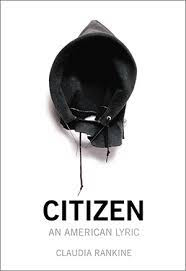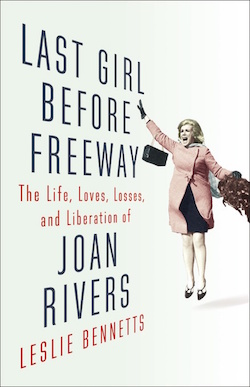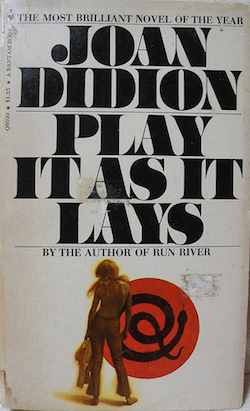See you at Third Place Books Seward Park on February 1st to discuss Hope in the Dark
Thanks to everyone who came out to Third Place Books Seward Park last night to discuss Citizen. Our next Reading Through It book club is on Wednesday, February 1st, and we're discussing Rebecca Solnit's book Hope in the Dark: Untold Histories, Wild Possibilities. It's available for 20% off at the Seward Park store from now until the 1st. We can't wait to see you there. If you're on Facebook, I hope you'll consider joining the Reading Through It group for occasional updates and reminders.
A room full of citizens
Published January 05, 2017, at 9:54am
Last night, the Seattle Review of Books and the Seattle Weekly hosted a book club to discuss Claudia Rankine's brilliant book Citizen. Here's what they learned.
Book News Roundup: All the literary updates you need, from Beacon Hill to Bellingham
Over at the South Seattle Emerald, Alex Garland examines the impact of the Beacon Hill library's closure on the community. The library will be closed for several months for renovations.
Here's Yoshiko Yamamoto's poster for this year's Seattle Antiquarian Book Fair, which happens at Seattle Center on October 15th and 16th:

Spokane's alternative weekly newspaper the Inlander has published a special poetry issue. If you love Northwest poetry, you need to check it out.
Rob Liefeld's ghastly Extreme Comics characters, many of which were published during the creatively bankrupt 1990s superhero comics glut that nearly destroyed the comics industry, have been optioned for a shared universe of superhero movies. I can't think of a better symbol for the oncoming superhero movie malaise than this dispiriting piece of news.
Now that garbage human Milo Yiannopoulos has signed a book deal fora quarter of a million dollars, maybe Yiannopoulos will finally pay out that $100,000 in scholarships for white men that he raised last year? Jack Smith IV at Mic reports that the scholarship hasn't benefitted a single student:
The money, however, has disappeared down a rabbit hole of private bank accounts and apparent shell companies registered to the same address in London. Almost a year since the fund's launch, Yiannopoulos is, for his part, reacting in a manner consistent with previous concerns around the fund's handling: by claiming paperwork for the fund is being processed and that the money will be disbursed at a later date.
Medium, the blogging service that has rapidly become both a popular longread supplement to Twitter and blog hosting platform for sites including The Awl and ThinkProgress, announced massive layoffs and office closures today. Seems they still don't know how to monetize words on the internet. And founder Ev Williams says the service is considering new ways to pay writers for their work, but his comments are so vague that they should provide absolutely no consolation for writers anywhere. Williams writes, "It is too soon to say exactly what this will look like. This strategy is more focused but also less proven." I take this as Silicon Valley-ese for "we have no idea what we're doing."
Bellingham's terrific independent bookstore Village Books is now officially under new management.
Your Week in Readings: The best literary events from January 4th - January 10th
Wednesday January 4th: Reading Through It: A Post-Election Book Club
See our Event of the Week column for details. Third Place Books Seward Park, 5041 Wilson Ave S, 474-2200, http://thirdplacebooks.com. Free. All ages. 7 p.m.
Alternate Wednesday January 4th: Contagious Exchanges
If you’re not attending a book club with the Seattle Review of Books and the Seattle Weekly, you should be at Mattilda Bernstein Sycamore’s queer literary salon series, which this month features two of the funniest writers in Seattle: poet/essayist Sarah Galvin and essayist/monologuist David Schmader. Hugo House, 1021 Columbia St., 322-7030, http://hugohouse.org. Free. All ages. 7 p.m.Thursday January 5th: The Expense of a View Reading
Polly Buckingham has long been a literary force out of eastern Washington — she helped found StringTown Press and she edits at Willow Springs Books. Tonight, she reads from her new story collection with the help of another eastern Washington gem — Spokane poet Nance Van Winckel, whose most recent collection is a “poetically altered encyclopedia,” which sounds fascinating. Elliott Bay Book Company, 1521 10th Ave, 624-6600, http://elliottbaybook.com . Free. All ages. 7 p.m.Friday January 6th: This Glittering Republic Reading
Seattle poet Quenton Baker hit it big late last year when he debuted his first collection, This Glittering Republic. His poems look at history and race and intergenerational burdens with a fresh eye. Baker is funny and brilliant and just about the closest thing to a voice of reason you can find in America, 2017. Elliott Bay Book Company, 1521 10th Ave, 624-6600, http://elliottbaybook.com . Free. All ages. 7 p.m.
Saturday January 7th: The End of My Career Reading
Seattle author Corinne Manning, who just stepped down from her leadership role as founder of the James Franco Review, will appear in conversation with memoirist Martha Glover, whose new book is about investigating workers’ comps claims for the state. The world of work is a troubling, complicated one, and Glover provides a unique perspective. Elliott Bay Book Company, 1521 10th Ave, 624-6600, http://elliottbaybook.com . Free. All ages. 7 p.m.Sunday January 8th: Stories from the Saturday Evening Post
It seems likely that this year will bring with it even more magazine closures, and that’s a goddamn shame. This reading of popular Saturday Evening Post pieces — in which local performers read work by P.G. Wodehouse, Robert Heinlein, and Shirley Jackson — ought to demonstrate what magazines, at their very best, are capable of promoting. Town Hall Seattle, 1119 8th Ave., 652-4255, http://townhallseattle.org. $10-13. All ages. 2 p.m.Monday January 9th: The Secret Life of Fat Reading
Sylvia Tara is a biochemist, and she’s about to give you a terrific reason to quit your New Year’s resolution before it even begins. The Secret Life of Fat examines the complicated role that fat plays in our lives: we hate it, even though it’s necessary to survive and it’s trying to protect us. Town Hall Seattle, 1119 8th Ave., 652-4255, http://townhallseattle.org. $5. All ages. 7:30 p.m.Tuesday January 10th: Salon of Shame
We’ve all got some residual shame in us after the godawful mess that was last year. That’s what makes the Salon of Shame so important: it’s like a ritual burning of shame, in which normal Seattleites gather to read their most embarrassing teenage writings. Come — be embarrassed, and then be free. Theatre Off Jackson, 409 7th Ave, http://brownpapertickets.com . $15. All ages. 8 p.m.Literary Event of the Week: Come discuss Citizen: An American Lyric with us tonight
Last month’s Reading Through It Book Club was a great success, a night in which nearly a hundred Seattleites gathered to discuss an America that they felt they didn’t recognize anymore. The event — a coproduction between the Seattle Weekly, the Seattle Review of Books, and Third Place Books Seward Park — didn’t provide a whole lot of answers, but it did evoke important questions of class and race and intergenerational poverty. People shared their own experiences with poverty, both from personal experience and as observers. They talked about their personal biases and how those biases might have failed them. They told jokes. They focused their view of the world through the lens of a book.
This Wednesday, I’ll be joining with Seattle Weekly editor-in-chief Mark Baumgarten and Seattle Review of Books co-founder Martin McClellan for the second Reading Through It at Third Place in Seward Park, and there will be so much to discuss.

Claudia Rankine’s book Citizen: An American Lyric first caught America’s attention when a young African-American women named Johari Osayi Idusuyi read it at a Trump rally in late 2015. Idusuyi, who was seated directly behind Trump in a video feed of the rally, pulled out Citizen and started reading it after she realized exactly the kind of event she had attended. (She told an interviewer at Jezebel that she went to the rally with “genuine intentions” to see if Trump would talk about “something of substance.” All of America would feel Idusuyi’s disappointment just one year later.) An old white couple took great offense at her literacy, and tried to get her to put the book down. She politely refused.
That whole exchange is remarkable because it’s exactly the kind of scene that would fit into the opening of Citizen. Rankine begins the book with a series of short paragraphs written in the second person detailing the many small frustrations and outrages black people experience in America today. These are not the cross-burning behaviors that come to mind when we hear about racism, but rather an array of microaggressions, thoughtlessness, and the learned normalization of whiteness.
Consider this tiny fragment of a sentence: “…he tells you his dean is making him hire a person of color when there are so many great writers out there.” It’s a small thing, but the idea it presents is so huge: through inarticulateness or ignorance or outright aggression, he’s stating that only white writers can be great, that writers of color can never be great. Perhaps someone out there — probably a white person — thinks this is inconsequential, that it’s a minor point. But Rankine continues to add up examples like this: the way Serena Williams is treated as a black tennis player, a white man shouting the n-word in a Starbucks who gets mad when people are offended by him. It looks less like a series of accidents and more like what it is: a system.
Citizen is a book that demands conversation. This is a time that demands thoughtfulness. I hope you’ll join us tonight for a thoughtful conversation about a remarkable book.
Short Run announced on Twitter that the next edition of the comix and small press expo will happen at Fisher Pavillion in Seattle Center on Saturday November 4th, 2017. Make a note of it. Here's why you'll want to go. I'll see you there.
Sherman Alexie, Lindy West, and Ta-Nehisi Coates all quit Twitter this week
On January 1st, Sherman Alexie announced in a Twitter post that he was leaving Twitter. The tweet read, in its entirety:
Hey folks, I'm leaving Twitter because its negatives increasingly outweigh its positives. Thank you for the follows.
Some speculated that Alexie's account had been hacked, but Alexie confirmed over email with the Seattle Review of Books that he decided to leave Twitter. His Twitter account appears to have been deleted (or at least deactivated) since that January 1st posting.
Alexie isn't the only writer to leave Twitter. Ta-Nehisi Coates announced yesterday that he was leaving the service for a year to work on his next book:
Ok. So I'm gonna take the year to try my hand at this fancy book writin' stuff. See y'all in '18. Take us out, Queen... pic.twitter.com/kLISnrMJE9
— Ta-Nehisi Coates (@tanehisicoates) January 2, 2017
And Lindy West deactivated her account last night:
Hey, friends! I'm going to deactivate my Twitter account, at least for a while. I'm finding the costs are starting to outweigh the benefits.
— Lindy West (@thelindywest) January 3, 2017
She wrote about her decision in the Guardian today:
I hate to disappoint anyone, but the breaking point for me wasn’t the trolls themselves (if I have learned anything from the dark side of Twitter, it is how to feel nothing when a frog calls you a cunt) – it was the global repercussions of Twitter’s refusal to stop them.
These three writers didn't coordinate their mass exodus. They're each leaving Twitter for different reasons. But it's clear that Twitter is approaching a tipping point.
Writers (including West) have complained for years about the platform's popularity with trolls. Twitter has acknowledged its troll problem, but it has not done much to stem the tides of neo-Nazis, so-called men's rights "activists," and other deplorable people who use the platform to anonymously harass and demean anyone they dislike. Twitter has done little to troll-proof their service over the past few years even as they've added and promoted an array of advertiser-friendly features. They have made their priorities clear: they care much more about shilling products than listening to their users.
And now the most powerful troll on the planet, Donald Trump, uses Twitter as his preferred communication platform. In fact, Twitter has become synonymous with Trump in a very uncomfortable way. It's hard to use Twitter these days without feeling like you're contributing to the feeding of the black hole of attention that is Trump. You can't escape the sensation that no matter how you respond to Trump's proclamations on Twitter — positively, negatively, indifferently — you're still nothing more than a tiny, doomed satellite in his orbit.
On a less apocalyptic level, other writers have complained for years that Twitter is a time-suck, that it gets in the way of writing, and reading, and living. Why provide free content for a free social media service with questionable morals, they say, when you could be writing your next book? It's a great question.
Even I, a Twitter-lover from way back, don't enjoy using the service very much anymore. Some people use Twitter to communicate complicated ideas in nigh-unreadable threaded "tweetstorms" that violate the idea of what Twitter is supposed to do. Others use it as Facebook-lite, another way to share insipid memes and reinforce their own sheltered worldviews. And every time Trump tweets, he causes another earthquake in which people retweet, riposte, and rehash every last syllable. Too many users are trying too hard to be funny while the world burns around them: sometimes, Twitter feels like a convention of awful Jon Stewart impersonators, all trying and failing to be witty and original in exactly the same way.
Simply, Twitter is not very fun anymore.
A few things keep me invested in the service. There's no better way to learn about breaking news, for one thing. For another, I follow a lot of very smart people, and I would miss their insights. Thirdly, as much as I hate Twitter, I hate every other social network even more: Snapchat is better for personal communication; Instagram requires photos, which aren't my thing; and Facebook's molasses-slow algorithm and chirpy, endlessly positive vibe makes Twitter look downright attractive in comparison.
But sooner or later, enough people I like are going to abandon the service, and the pain-to-pleasure ratio will tip unfavorably. I don't know how Twitter will survive 2017 without making some drastic changes to its service. Maybe it's already too late.
Introducing our new Poet in Residence program
Every week for the last year and a half, we've presented new poems by Seattle-area poets. It's been a tremendous honor — we've been proud to pay poets for their work, and to meet so many of the talented individuals who call Seattle home. We hope you enjoy stopping by the site every Tuesday morning to read a new poem. But because it's a new year, we thought we'd try something new for our recurring Tuesday feature. It's not a drastic change, mind you — we're just adjusting the formula a little bit.
I'm very pleased to announce that Elisa Chavez is the Seattle Review of Books' very first Poet in Residence. What does this mean? Well, instead of publishing a new poet every Tuesday, we're going to choose a new poet every month. So we'll be running a poem by Elisa every Tuesday in January. We think this will give you a chance to get to know her work a little better — that by reading a few of her poems, you'll get a better understanding of her work, and her interests, and her many styles. We'll be running an interview with her on the site this month, too.
This does mean you're going to meet fewer poets on our site this year — rather than 52 new poets, we're only presenting 12 new poets in 2017. But instead of a drive-by poetry experience, we'll really be able to closely examine these dozen poets. (And of course the poets in residence will be paid for all their poems, too, which will result in a much heftier paycheck.) No poet's body of work can be condensed down to a single poem; we hope this way you'll be able to triangulate Elisa's writing a little more, to see what she's really like as an artist. And then in February, we'll choose a new poet to feature. And then a new poet in March, and so on.
We found Elisa through Lesley Hazleton's blog, The Accidental Theologist. Hazleton wrote enthusiastically about Elisa's poem "Revenge" in a beautiful post titled "The Poem That Stopped Me Crying." I want to thank Hazleton for bringing Elisa to our attention, and for promoting Seattle poets on her blog. Her generosity of spirit makes this city a better place every damn day.
We'd love to hear your thoughts on the Poet in Residence program. You can reach us, as always, on Twitter, on Facebook, or through email. Please let us know what you think.
Revenge
Since you mention it, I think I will start that race war.
I could’ve swung either way? But now I’m definitely spending
the next 4 years converting your daughters to lesbianism;
I’m gonna eat all your guns. Swallow them lock stock and barrel
and spit bullet casings onto the dinner table;I’ll give birth to an army of mixed-race babies.
With fathers from every continent and genders to outnumber the stars,
my legion of multiracial babies will be intersectional as fuck
and your swastikas will not be enough to save you,because real talk, you didn’t stop the future from coming.
You just delayed our coronation.
We have the same deviant haircuts we had yesterday;
we are still getting gay-married like nobody’s business
because it’s still nobody’s business;
there’s a Muslim kid in Kansas who has already written the schematic
for the robot that will steal your job in manufacturing,
and that robot? Will also be gay, so get used to it:we didn’t manifest the mountain by speaking its name,
the buildings here are not on your side just because
you make them spray-painted accomplices.
These walls do not have genders and they all think you suck.
Even the earth found common cause with us
the way you trample us both,oh yeah: there will be signs, and rainbow-colored drum circles,
and folks arguing ideology until even I want to punch them
but I won’t, because they’re my family,
in that blood-of-the-covenant sense.
If you’ve never loved someone like that
you cannot outwaltz us, we have all the good dancers anyway.I’ll confess I don’t know if I’m alive right now;
I haven’t heard my heart beat in days,
I keep holding my breath for the moment the plane goes down
and I have to save enough oxygen to get my friends through.But I finally found the argument against suicide and it’s us.
We’re the effigies that haunt America’s nights harder
the longer they spend burning us,
we are scaring the shit out of people by spreading,
by refusing to die: what are we but a fire?
We know everything we do is so the kids after us
will be able to follow something towards safety;
what can I call us but lighthouse,of course I’m terrified. Of course I’m a shroud.
And of course it’s not fair but rest assured,
anxious America, you brought your fists to a glitter fight.
This is a taco truck rally and all you have is cole slaw.
You cannot deport our minds; we won’t
hold funerals for our potential. We have always been
what makes America great.
We're taking the day off to enjoy our loved ones, and we hope you'll do the same. Tomorrow we begin a new year in earnest, with several fun new features and more on the way. But today, if you're looking for something to do, stop by Comics Dungeon in Wallingford for their annual year-end (and year-beginning) sale. Take it from me: there is no joy as pure as digging through a box of $1 comics and finding $20 worth of cultural artifacts to plow through on a cold winter afternoon.
Choose your own year in reading
Published January 01, 2017, at 10:02am
Which book are you starting 2017 with? Here are two good options — one fiction, and one non-fiction.
The Sunday Post for January 1, 2017
The Great A.I. Awakening
This piece by Gideon Lewis-Kraus is a little late to the Sunday Post but is so darned good we can’t resist. Artificial intelligence and machine learning are an arms race in the tech sector right now. Most progress is incremental, but the breakthroughs — like Deep Blue’s victory over Fan Hui — are both exhilarating and terrifying. Now Google Translate has another.
Epic geekery, global collaboration, and a translation of The Snows of Kilimanjaro. Order a second cup and settle in for this one.
Pichai has an affection for the obscure literary reference; he told me a month earlier, in his office in Mountain View, Calif., that Translate in part exists because not everyone can be like the physicist Robert Oppenheimer, who learned Sanskrit to read the Bhagavad Gita in the original. In London, the slide on the monitors behind him flicked to a Borges quote: “Uno no es lo que es por lo que escribe, sino por lo que ha leído.”
Grinning, Pichai read aloud an awkward English version of the sentence that had been rendered by the old Translate system: “One is not what is for what he writes, but for what he has read.”
To the right of that was a new A.I.-rendered version: “You are not what you write, but what you have read.”
It was a fitting remark: The new Google Translate was run on the first machines that had, in a sense, ever learned to read anything at all.
Darling Nikki
In one last look back, Maggie Nelson’s gleeful, thoughtful, sex-fiend celebration of Prince’s Purple Rain.
Did I want to be Prince or be with Prince? I think the beauty is, neither. He made it O.K. to feel what he was feeling, what I was feeling. I wanted to be a diminutive, profuse, electric ribbon of horniness and divine grace. I bought a white shirt with ruffles down the front and wore it with skintight crushed-velvet hot pants, laid a full-length mirror on the floor, and slithered on top of the mirror, imitating Prince’s closing slither on the elevated amp in “Darling Nikki.” Yeah, he’s telling Apollonia to come back, but you can tell he doesn’t really give a shit about Apollonia. He’s possessed by something else, his life force onstage. Half naked, wearing only black bolero pants and a black kerchief tied over the top part of his face, his torso slick with sweat, Prince is telling us a story. An important one.
A Year in Reading: Kevin Nguyen
Kevin Nguyen is angry at Book Twitter, primarily and unfortunately for being Book Twitter. Agree or disagree, a powerful read alongside Simon and Schuster’s recent announcement.
After the election, there was no soul searching on Book Twitter. No one questioned the power structures of publishing. Can we talk about how one of the Big Five publishers is owned by News Corp? Often the publishing of things like Bill O’Reilly’s twisted histories is justified as a means to support literary fiction. But does anyone ask if that trade-off is worth it?
The Crazy Story of the Professor Who Came to Stay — and Wouldn't Leave
Elizabeth Abel, an English professor at the University of California-Berkeley, handed her housekeys to a colleague for the duration of her sabbatical in Paris. When the rent stopped coming, she asked him to leave. It was the first act in months-long struggle to reclaim her home and a tragicomedy of academic indignation.
Ian Gordon documents Abel’s experience with the dark side of the sharing economy.
Abel peered behind him into her living room, which was practically empty. Most of her furniture was gone: a dining table and four chairs, two easy chairs, an antique piece. Her books and rugs were nowhere to be seen. Even the artwork had been taken off the walls.
As Abel walked around the place she'd called home for three decades, she had the distinct feeling that her life had been erased.
The Scare Quote: 2016 in a Punctuation Mark
Stop worrying about whether grandma is joining dinner or is dinner — punctuation has subtler tricks up its sleeve. Megan Garber reports on the rise of the scare quote: the sardonically raised brow, the sneer, and the cowardly sidestep of this ugly political moment.
Those little marks, hovering miasmically over our civic discourse, also suggest, in the aggregate, the unsettling fragility of language. Scare quotes aren’t just about distance; they’re also about disruption. They are a little bit belligerent, and a little bit anarchic. They want to destabilize, to make us question the things we thought we shared — indeed, to question who the “we” really is in the first place.
"China under the Covers" goes to press - Kickstarter Fund Project #52
Every week, the Seattle Review of Books backs a Kickstarter, and writes up why we picked that particular project. Read more about the project here. Suggest a project by writing to kickstarter at this domain, or by using our contact form.

What's the project this week?
"China under the Covers" goes to press. We've put $20 in as a non-reward backer
Who is the Creator?
What do they have to say about the project?
A bookbinding manual and an adventure tale, "China under the Covers" blends history, romance, and how-to as East and West connect.
What caught your eye?
I'm a sucker for a book on how to bind books. It's that simple. That this one is from a Portland author, and the story has more than just how-to is a kind of bonus. It's a hybrid how-to-bind-books book, and that just seems like a great choice for this, our last Kickstarter Fund Project item.
Why should I back it?
If you love bookbinding, China, the history of books and conservation, or just want to support a Northwest author, that's a good reason. But also, this is exactly the kind of book a large publisher would find a tremendous risk, but is perfect for Kickstarter. It proves there's a market, and it proves there's interest in stories this personal, interesting, and specific.
How's the project doing?
She's 144% funded, so it's obvious that there are many bookbinding nerds out there waiting for this book.
Do they have a video?
Kickstarter Fund Stats
- Projects backed: 52
- Funds pledged: $1040
- Funds collected: $900
- Unsuccessful pledges: 3
- Fund balance: $0!
A gentle reminder: bring your new or as-new book to Open Books today and take home a poetry book for free. Details:
Don't forget to bring books to donate to Books to Prisoners by Dec 30! @B2PSeattle pic.twitter.com/uurrExi2ym
— Open Books (@openpoetrybooks) December 28, 2016
Journey to the heart of the ultimate mean girl
Joan Rivers was one of the most fascinating entertainers of the 20th century. Anyone over the age of 30 can probably tell you something about her life — the way Johnny Carson blacklisted her from his show, for instance, or her QVC shopping empire, or her vicious insults of celebrities, or her catchphrase, "can we talk?" — and every adult under 30 has undoubtedly seen a comedian who was profoundly influenced by Rivers's work.
But there are so many acts to Rivers' life that it's hard to keep track of them all. She climbed to the top of showbiz and fell to the bottom of the heap so often that her life reads like a gaudy amusement park ride. Nobody else danced so eagerly with fame, or was let down by fame's fickle moods so often. You can get whiplash just reading about one of her falls from grace.

Leslie Bennetts's biography of Rivers, Last Girl Before Freeway: The Life, Loves, Losses, and Liberation of Joan Rivers, provides an eagle-eyed view of Rivers's entire life, and the vistas are breathtaking. Rivers interacted with every major entertainment figure of her time, and she even made an impact outside of the Hollywood bubble: she practically made a career out of mocking first ladies and daughters of presidents. It's a lot to keep track of, and Bennetts does it beautifully.
Thankfully, Bennetts doesn't lose track of Rivers's many contradictions. Rivers built her career like a feminist — she forced her way into a male-dominated field, and she never let those men forget that a woman got more laughs than they did. But she behaved in ways that seemed downright misogynistic: Rivers gloated about the fact that her fortune was built on cruel fat jokes made at Elizabeth Taylor's expense. She continued to mock women throughout her life, including Kristen Stewart, Angelina Jolie, and others.
Bennetts indicates that Rivers was operating from a place of insecurity, a sense that Rivers always wished she was beautiful: "Rivers believed that women were meant to get love through the one irreplaceable asset she lacked, and she never got over the unfairness of being sentenced to a life deprived of the power of physical beauty." It's not a cop-out meant to absolve her of blame: Bennetts doesn't justify Rivers's behavior, she merely observes it.
In the end, Rivers doesn't reconcile her cruelty. Life doesn't work like that. And those contradictions and heartbreaks and triumphs and tragedies make for one of the most entertaining biographies I've read this year.
Portrait Gallery: Books
Each week, Christine Marie Larsen creates a new portrait of an author for us. Have any favorites you’d love to see immortalized? Let us know

Happy New Year!
May you always have a shelf full of good books to read.
The Hollywood Reporter ran a gushing press release this morning announcing Simon and Schuster's decision to publish Milo Yiannopoulos's memoir. Get a load of this swill:
"I met with top execs at Simon & Schuster earlier in the year and spent half an hour trying to shock them with lewd jokes and outrageous opinions. I thought they were going to have me escorted from the building -- but instead they offered me a wheelbarrow full of money," Yiannopoulos told THR.
Jesus, isn't it boring? Isn't that the most boring teenage bullshit you've read in your life? Don't get me wrong: Yiannopoulos is a white supremacist and a fascist. His beliefs are dangerous and he has been a cheerleader for society's villains for exactly as long as he's been on the world stage. We should not normalize his beliefs because they will, if unchecked, destroy society.
No, when I say Yiannopoulos is boring, I'm talking about his schtick, the method through which he communicates his hate. Yiannopoulos fancies himself a shock-jock, a more political Andrew Dice Clay or Marilyn Manson for the 21st century. He thinks he's edgy, and he praises himself for promoting shock and outrage when really promoting shock and outrage is just about the easiest thing in the world to do.
I'm already seeing calls to boycott Simon & Schuster and I'm already seeing Yiannopoulos supporters on Twitter cry censorship over those calls, even though it's not censorship at all. So let's lay it plain: Simon & Schuster is most definitely paying a white supremacist and a fascist (albeit a boring one who fancies himself a provocateur) a quarter million dollars to write a book. There's no other way to put it.
Thursday Comics Hangover: Vote for more superhero comics like this
By the end of 2016, I found myself completely disillusioned by corporate comics. Marvel Comics seem to be a neverending morass of recycled events and weird brand management choices. A few DC Comics titles are promising, but it seems as though getting comfortable there might be a mistake since the entire line will likely be rebooted as soon as sales drop low enough. These things happen in cycles, of course. A few years ago, Marvel was producing a bunch of work that transcended corporate dictates, and DC has had its moments over the last decade, too. I have faith that soon someone will break the cycle and make something worth reading again.

This election is between a smarmy Hydra agent (who Ms. Marvel calls “Chuck the Hydra hipster”) and a competent woman. The allegory for Clinton Vs. Trump is pretty on-the-nose for a corporate comic. Ms. Marvel travels around her beloved Jersey City, trying to recruit voters, but those voters are too apathetic to care. Moms are busy, crazy old cranks “haven’t voted since 1972” because they’re “protesting all the things,” and others believe that both candidates suck pretty much equally.
Because it’s a superhero comic, and because Ms. Marvel is thoroughly an optimistic work that believes the best of people, good triumphs over evil. That made Ms. Marvel a bitter pill to swallow in the weeks after the election, but this comic is already aging well. I read it now and think about what might have been had we seen a few more positive-hearted activists in the right places around the country. I read it and think that things can get better, and that democracy is worth the fight. It’s a superhero comic written from a personal, aspirational perspective, one that believes in a better world. Hey, DC and Marvel: more like this in 2017, please.
Your Week in Readings: The best literary events from December 28th - January 3rd

Wednesday December 28th: Play It As It Lays Book Club
Booksellers at the south end’s newest bookstore discuss the divine Joan Didion’s 1970 novel Play It As It Lays. Didion is (rightfully) best known for her nonfiction, but her novels are in danger of being entirely forgotten. Let Thid Place’s Anje and Wesley help you understand why that would be an absolute crime. Third Place Books Seward Park, 5041 Wilson Ave S, 474-2200, http://thirdplacebooks.com. Free. All ages. 7 p.m.Friday, December 30th: 2016 Fuck Off
The owners of Seattle’s newest comics store, the recently Kickstarted Outsider Books in Fremont, is closing out the year with a party that includes a sale on comics, food and drink, some games, and information about how to get involved in your local community. If you haven’t checked out Outsider yet, this is the perfect excuse. Outsider Books, 223 N. 36th St., 535-8886, http://outsidercomics.com/. Free. All ages. 5 p.m.Sunday January 1st: Third Place Books Book Sale
This has become a Seattle new year’s tradition: every branch of Third Place Books—including this year’s new edition, the Seward Park store, kick off the new year with a giant 20% off sale of every book on their shelves. Go stock up for the winter. Third Place Books Locations, http://thirdplacebooks.com. Free. All ages. 10 a.m.[CORRECTION: An earlier version of this post claimed that Third Place Books was selling only used books at 20 percent off on January 1st. In fact, they're selling every book, new and used, at 20 percent off.]
